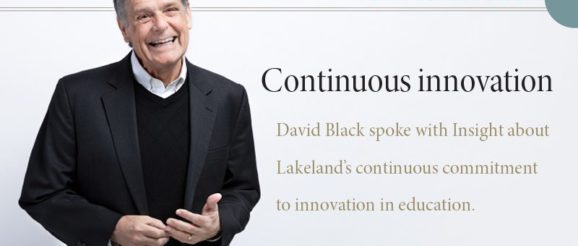Insight Publications | Continuous innovation

Personalities
David Black is in his second stint as president of Lakeland University in Plymouth. He originally served at the school from 1989 to 1997 before leaving to become president at Eastern University in St. Davids, Pa. He retired in 2013 but returned to Lakeland as interim president in January 2017. The following May, the university’s board of trustees removed the interim title, naming him president again.
Since rejoining the university, Black has launched several initiatives, including collaborating with the Sheboygan Area School District and Lakeshore Technical College to create College Here and Now, a first-of-its-kind program that allows high school students to earn their associate degree in high school and provides the opportunity to obtain a bachelor’s degree in computer science after just two years at Lakeland.
Black spoke with Insight about Lakeland’s continuous commitment to innovation in education.
What brought you out of retirement to lead Lakeland again?
David Black: When I was here the first time, I fell in love with Lakeland’s theory of teaching and learning, which utilizes the Kant method. The German immigrants who founded our school brought that with them. The Kant method says students learn best through experiences. It’s a great way to not only prepare students for their future careers, but also prepare them for life. When the last president left, I had a couple of friends on the board of trustees who asked me to come back on an interim basis. I didn’t want to be just a placeholder, so I came in with a few different ideas, such as creating a more cooperative learning environment that would help reshape the university experience for students.
How do students benefit from the cooperative learning environment?
If I’m an 18-year-old student trying to figure out who I am, it helps me to participate in this type of learning environment. Our school year doesn’t run for just nine months — it’s a 12-month experience. They take classes and also work in a paid co-op in their chosen profession. If I’m an accounting student, I’m working a co-op in that area with a business that is paying me. This process is beneficial in multiple ways. It helps the students not only earn money to lessen their debt, but it can also help them determine if that career is right for them. The businesses benefit since they have workforce needs our students can fill. Lakeland benefits because the co-op experience adds to the students’ learning experience and differentiates us from other universities. In fact, we saw a 24 percent increase in first-time, full-time freshman enrollment last fall. We attribute that to our cooperative program.
Lakeland seems to work closely with area employers. In addition to the co-op program, you partnered with local food manufacturers on a new program to help teach food safety. How do you get buy-in from area businesses to work with you?
We are fortunate to be where we are — Sheboygan County is home to many family-owned businesses that know and understand who we are. Their leaders or their employees have gone here. They see us as an asset to the community.
I think back to the companies that worked with us on setting up our cooperative program. We heard businesses were having issues with talent and went to them with an idea of having our students work for them. We had 11 businesses, including some that are household names — Kohler, Johnsonville, Sargento — sign on at the start. That support was crucial. We’re one and a half years into our cooperative program and it is really a win for everyone.
As for the food safety program, this again was created to help our local businesses. They had a need for employees or prospective employees to receive this kind of training. It turned out to be a great fit.
College Here and Now is also something we haven’t seen before in the region. Do you see that type of program as a growing trend in education?
I think we’ll definitely see more students earning college credit while still in high school in the next five to 10 years. That means less time spent on campus to earn a bachelor’s degree, which lowers overall tuition costs. That’s what we envisioned with College Here and Now. Students in the Sheboygan Area School District can take dual-credit classes while still in high school, which allows them to earn an associate degree in information technology. They earn their high school and technical college degrees at the same time. Students then come here for two years to earn their bachelor’s degree in computer science. If they participate in a cooperative learning opportunity, they will also be able to make money while in college, which lowers their debt exposure.
I’m proud to say Lakeland has been on the cutting edge of education for years. We were the first to trademark the technology that made our blended education program possible. Blended education has been a real game changer since students can take classes in person, online or both.
Innovation is part of our DNA here at Lakeland. We are more nimble and can do things quicker than state schools. We also believe in the importance of lifelong learning. I think we will spend the next few years rethinking how we do what we do.
